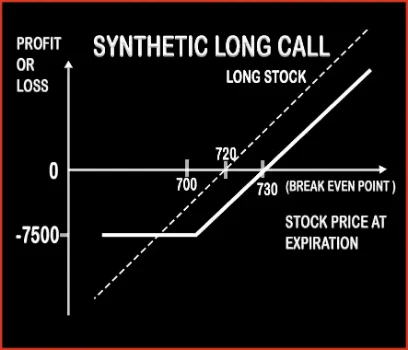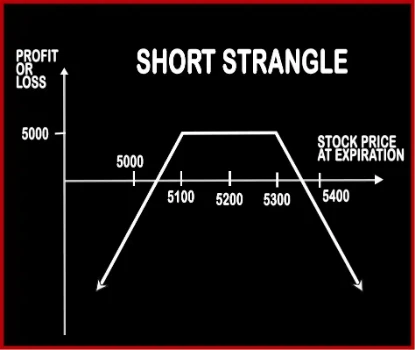Compare Strategies
| SYNTHETIC LONG CALL | SHORT STRANGLE | |
|---|---|---|

|

|
|
| About Strategy |
Synthetic Long Call Option StrategyA trader is bullish in nature for short term, but also fearful about the downside risk associated with it. Here, a trader wants to hold an underlying asset either in physical form like in case of commodities or demat (electronic) form in case of stocks. But he is always exposed to downside risk and in order to mitigate his losses, |
Short Strangle Option StrategyThis strategy is similar to Short Straddle; the only difference is of the strike prices at which the positions are built. Short Strangle involves selling of one OTM Call Option and selling of one OTM Put Option, of the same expiry date and same underlying asset. Here the probability of making profits is more as there is a spread between the two strike prices, and if .. |
SYNTHETIC LONG CALL Vs SHORT STRANGLE - Details
| SYNTHETIC LONG CALL | SHORT STRANGLE | |
|---|---|---|
| Market View | Bullish | Neutral |
| Type (CE/PE) | CE (Call Option) | CE (Call Option) + PE (Put Option) |
| Number Of Positions | 2 | 2 |
| Strategy Level | Beginners | Advance |
| Reward Profile | When Price of Underlying > Purchase Price of Underlying + Premium Paid | Limited |
| Risk Profile | Limited (Maximum loss happens when the price of instrument move above from the strike price of put) | Unlimited |
| Breakeven Point | Underlying Price + Put Premium | Lower Break-even = Strike Price of Put - Net Premium, Upper Break-even = Strike Price of Call+ Net Premium |
SYNTHETIC LONG CALL Vs SHORT STRANGLE - When & How to use ?
| SYNTHETIC LONG CALL | SHORT STRANGLE | |
|---|---|---|
| Market View | Bullish | Neutral |
| When to use? | A trader is bullish in nature for short term, but also fearful about the downside risk associated with it. | This strategy is perfect in a neutral market scenario when the underlying is expected to be less volatile. |
| Action | Buy 1 ATM Put or OTM Put | Sell OTM Call, Sell OTM Put |
| Breakeven Point | Underlying Price + Put Premium | Lower Break-even = Strike Price of Put - Net Premium, Upper Break-even = Strike Price of Call+ Net Premium |
SYNTHETIC LONG CALL Vs SHORT STRANGLE - Risk & Reward
| SYNTHETIC LONG CALL | SHORT STRANGLE | |
|---|---|---|
| Maximum Profit Scenario | Current Price - Purchase Price - Premium Paid | Maximum Profit = Net Premium Received |
| Maximum Loss Scenario | Premium Paid | Loss = Price of Underlying - Strike Price of Short Call - Net Premium Received |
| Risk | Limited | Unlimited |
| Reward | Unlimited | Limited |
SYNTHETIC LONG CALL Vs SHORT STRANGLE - Strategy Pros & Cons
| SYNTHETIC LONG CALL | SHORT STRANGLE | |
|---|---|---|
| Similar Strategies | Protective Put, Long Call | Short Straddle, Long Strangle |
| Disadvantage | •Chances of loss if the underlying goes down. •Incur losses if option is exercised. | • Unlimited loss is associated with this strategy, not recommended for beginners. • Limited reward amount. |
| Advantages | •Limited risk, unlimited profit. •Protection to your long-term holdings. • Limited loss to the to the premium paid for Put option. | • Higher chance of profitability due to selling of OTM options. • Advantage from double time decay and a contraction in volatility. • Traders can book profit when underlying asset stays within a tight trading range. |